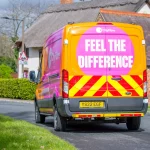Broadband and Mobile Providers Pledge to Help UK Gov Improve Digital Skills

The UK government has today set out its plan for increasing digital skills to help “deliver growth and opportunity for all“, which among other things includes various pledges from key ISPs and mobile operators (e.g. BT, CityFibre, Vodafone etc.) to help support the initiative and break down the digital divide that still exists for many people.
Research typically shows that people who are digitally excluded can face higher costs for things like home insurance, train travel and food – often paying up to 25% more than consumers who are online and better able to take advantage of such access.
The Government’s new Digital Inclusion Action Plan is thus an attempt to address this problem via a series of “urgent actions” that it hopes will “begin fixing digital exclusion“. The plan includes funding for local initiatives targeted to the most digitally-excluded groups (e.g. the elderly and low-income households) and partnering with inclusion charity Digital Poverty Alliance (DPA) to provide laptops to people who are digitally excluded.
Advertisement
Peter Kyle MP, Technology Secretary, said:
“The technological revolution we are living in is not only transforming everyone’s lives, but is advancing at breakneck speed, and will not slow down any time soon.
Leaving people behind in the process could threaten our mission to maximise technology for economic growth and better public services, which is central to our Plan for Change.
Only by making technology a widely accessible force for good can we make it a positive catalyst for societal change – whether that means helping a sick patient speak to a GP remotely or giving a young person the devices they need to apply for online jobs or renting a flat.”
Till Sommer, Head of Policy, ISPA UK, said:
“We welcome today’s cross-departmental government action to help meet the challenge of digital inclusion, an issue which has been insufficiently addressed for too long.
The proposal for cross-government working, if implemented effectively, will complement existing industry initiatives that our members and the broadband sector have long championed. The Action Plan rightly acknowledges that real-term prices for broadband have decreased, however, it is important to recognise that a holistic approach is needed to help those in lower income brackets and will require close collaboration between the Government and industry.
We are pleased that the Action Plan acknowledges the efforts of our members, reaching communities at both local and national levels, including extending networks to all corners of the UK, offering a range of broadband social tariffs to provide affordable and reliable connectivity, collaborating with local authorities and housing associations to provide free connectivity, supporting job seekers, and working with charities on digital skills programmes and device donations.”
The plan has also managed to extract pledges from key technology and telecoms companies to help the Government achieve its mission. For example, Google and BT have pledged to deliver digital skills training to thousands in the UK, while Vodafone has committed to help 1 million people by donating connectivity and technology, affordable services, and upskilling communities (see a full list below).
Some of these pledges are really just a continuation of what such operators have already been doing for the past few years, although we have our doubts about the Government’s ability to resolve the issue completely. This is because we’ve seen lots of initiatives aimed at improving digital skills over the years, but they often struggle when it gets to the more challenging questions.
For example, it’s often overlooked that not everybody actually wants to go online and nobody should be forced to use the internet, even if this may leave them at a disadvantage. Similarly, digital skills can change with age, as well as disability (the two are often associated). For example, you might be digitally skilled today, but this can go in reverse when you develop a disability (loss of sight, strokes etc.), which can make life a lot more difficult.
The reality is that some people will always require offline support in order to achieve what society asks or expects of us. Now for that list of industry pledges..
Advertisement
Pledges from Technology and Telecoms Firms
Google will develop a new partnership with DSIT to deliver intensive digital skills training to support adults with low digital skills, helping them succeed in the modern work environment.
CityFibre has committed to installing 170 connections to 170 premises in Norfolk, Suffolk, Leicestershire, Kent, East and West Sussex, Buckinghamshire, Cambridgeshire and surrounding areas by 2030. As part of this, these premises – including residential and community hubs – will be given their first 6-month broadband package for free.
Virgin Media O2 has already connected over 350,000 digitally excluded people. It is committing to increasing this to 1 million people by the end of 2025, through expanded provision of data and devices to those that need it.
Vodafone
Vodafone will help 1 million people cross the digital divide in 2025 through donating connectivity and technology, affordable services, and upskilling communities. This includes a commitment to maintain their social tariff product offerings. To support closing the digital infrastructure divide, Vodafone will continue to invest in rolling out their network to the whole of the UK.
WightFibre commits to providing free or discounted broadband to community groups and charities, including community centres, digital hubs and village halls, on the Isle of Wight. These community organisations will promote that they have free Wi-Fi available on-site for public use.
Good Things Foundation, Vodafone and Deloitte
Good Things Foundation, Vodafone, and Deloitte are working together with the Government to lead the development of a charter for responsible device donation. This will establish common principles for businesses and organisations to commit to: increasing the number of devices donated to digitally excluded people; reducing electronic waste; and promoting circularity.
BT
Connectivity:
· BT has already connected over 300,000 digitally excluded households through its social tariffs, which also include a lower £15 tariff for ‘zero income’ households, and will continue to offer these tariffs to millions of people on Universal Credit who are eligible for them.
Community WiFi:
· BT Group has the country’s largest public WiFI network, with some 5.5m EE and BT hub locations (in households and commercial premises) available for eligible customers to connect to. BT and EE have agreed to pilot two new approaches to extend the use of this network to a much larger number of digitally excluded households:
– by providing log-ins for free WiFi to eligible families through charity and public sector partnerships
– by providing community WiFi services, free at the point of use, at a much larger number of libraries and community centres, including working with government to identify and prioritise connections to 500 community hubs in deprived areas
· To succeed, this initiative will need support from local partners, which the pilot phase of the project will seek to ensure.
Skills:
· BT commits to providing digital training to thousands of older people and children in 2025, through their partnership with AbilityNet and their Work Ready programme.
· BT commits to providing 500 adults with disabilities with digital devices, data and support in 2025, through their partnership with Keyring.
· Openreach is building ultrafast ultra-reliable Full Fibre broadband to 25 million premises by December 2026 and ultimately aiming to reach as many as 30 million by 2030 if the right investment conditions exist.
· As we build, we’ll work with the government to upgrade connectivity to at least 500 community hubs in deprived areas, helping people across the country to get online, with the majority delivered by the end of 2026. We’ll also work with our communications provider customers to offer the services these sites need, as soon as our network’s been built.
Sky (Sky Broadband, Sky Mobile, Sky TV)
Through Sky Up – Sky’s social impact programme – Sky will commit to supporting 70 Sky Up Hubs across the UK help people bridge the digital divide by providing reliable internet connections, tech equipment and digital training in partnership with local charities in 2025.
Three UK
· To support those facing digital exclusion, Three will donate over 2 million GB of data to an estimated 80,000 people by 2026.
· To help bridge the digital divide, Three’s Discovery digital-skills training programme seeks to reach over 270,000 people by 2030.
· Through the Reconnected scheme, Three aims to save around 30,000 unused devices to help disadvantaged people get connected.
Mark is a professional technology writer, IT consultant and computer engineer from Dorset (England), he also founded ISPreview in 1999 and enjoys analysing the latest telecoms and broadband developments. Find me on X (Twitter), Mastodon, Facebook, BlueSky, Threads.net and Linkedin.
« Adtran’s Full Fibre Tech Powers 8.6 Million of Openreach’s UK Premises
Jurassic Fibre Broadband ISP Customers Hit by UK Price Rises »






















































Comments are closed